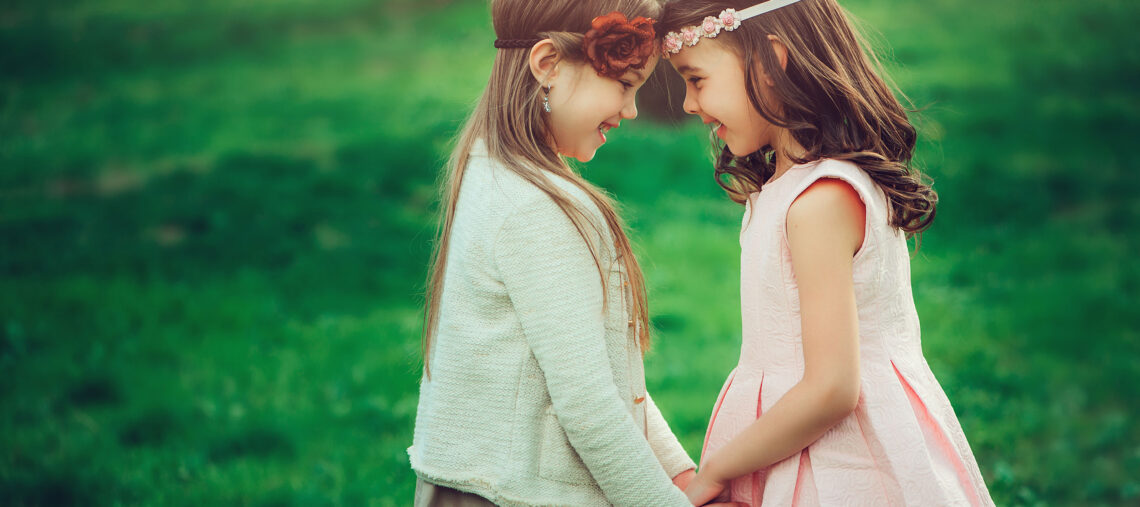
I remember walking into the cafeteria of my new school, and it was like someone punched me in the stomach. I was in sixth grade. My family had just moved from Virginia to Ohio. At first, I attended the local Catholic school. Within the first two months, I was begging my parents to go to the public school because the girls were so mean to me. And when I look back, wow, were they cruel.
My maiden name is Ackerman. They’d call me “Lisa Acneman” as sixth grade brought with it oily skin and some breakouts. When my parents decided that I would change schools, I felt relieved. Off to public school I went. But soon I found out that it didn’t matter whether I went to parochial or public school: girls were still mean.
Instantly, a group of girls took me in
They invited me to sit at their lunch table. Little did I know that they had kicked another girl off the table so I could sit with them. I was so grateful to have friends, but I was a bit naïve. Maybe that’s because I grew up in a home where we all supported each other and my assumption going “out into the world” was that everyone was like that, too.
Then one day I walked into the cafeteria, and I nearly dropped my brown paper lunch bag. I looked at the table where I had been sitting for the past week, my first week at school. I counted the number of girls at the table—eight. Eight was the maximum number of people who could sit at one table. The two girls who were the “leaders” looked at me, whispered to the other girls at the table, and everyone turned to look at me and laugh.
My heart sank. I went up to the table and feebly asked, “Is there space for me here?” hoping maybe I was wrong or that it wasn’t as it seemed. I couldn’t feel my feet beneath me. I felt dizzy.
I can’t remember what they said, but I must have gotten the picture because I remember turning and quickly looking around for a new place to sit. It was a small cafeteria so someone would notice me standing all alone soon. I didn’t want anyone to look at me. My ears were ringing, my hands were clammy, and my heart was beating out of my chest. I felt the eight girls’ snickering whispers like daggers in my back. There was no physical fight or blowup so the teachers on lunch duty were none the wiser.
I saw a table with no one at it. So, I sat down. I wanted to cry. But I didn’t.
I sat alone for two months
Eventually, I sat with a new group of people. For the next two years that we lived in Ohio, I had some good experiences—I even have a friend from that time who is still one of my best friends. But the two girls who banished me from the lunch table continued to be bullies. Yes, that’s what I can call them now as a psychotherapist and adult who understands what was really going on. They were the kind of “friends” who would invite you over and you’d feel like, “Oh, good! We are friends again!” only to have them negatively talk about you or put you down.
We all have had experiences like this
Just the other day, another mom friend of mine told me that she waved to two moms talking and they looked at her and laughed. It happens in childhood. It can also happen between adult women.
As a psychotherapist, I intimately know that when someone hurts others it’s because they are hurting. I have counseled both the bully and the one being bullied.
I know, too, from counseling parents how, when our children’s lives eclipse our own, we remember (consciously or unconsciously in our body’s cellular memory) our own experiences of hurt, rejection, and betrayal. And those old experiences, though healed, come back up and make us tender.
I had an opportunity recently to feel such tenderness. I’ll share that story in a moment.
But first, I want to share this—the triumph. What came out of my experiences with “mean girls”?
I became an “includer”
After these heartbreaking experiences, I became someone who sees the outsider and looks to include them. I became someone who is good at bringing people in and making them feel like they matter and are a part of things.
I learned through years and years of mindfulness and compassion practices how to create space to “include everything” and how to abide with whatever is arising—even the nasty, hard-to-look-at, shameful parts of myself. I practiced forgiveness.
Those two bullies? I forgave them, even though they didn’t ask for my forgiveness. Other people who have hurt me? Other people I have hurt? I’m working on receiving forgiveness and extending forgiveness to them, too. Nothing and no one is excluded from forgiveness. Everything and everyone is included.
I became an “includer” in my work
As a psychotherapist and coach with individuals and groups, I can hold space for someone and help them learn how to include it all—to hold the parts of themselves they might have abandoned, ignored, tried to keep quiet, or kicked to the curb. I can abide with a client as they learn that excluding anything creates more suffering.
I became an “includer” in my family
As parents, Brian and I model compassion and empathy to our children. We try to create “abiding space” for our children to mindfully name and express whatever is happening within them. On the good days, I can say, “I’ll abide with you. I’ll be with you in this.” And, of course, there are days when I am short-fused and I snap at them. Then, we begin again. We come back together and include even those less-than-perfect moments in our human and imperfect way of being family.
Our family has become “includers”
We are about community and creating space—in our home, in our lives, in our hearts—for adults and children to feel loved and included just as they are.
Through gentleness, compassion, and mindful attention, these early experiences of rejection, betrayal, and hurt transformed me. Through loving attention, through learning to include it all with mindfulness and compassion, I—along with lots of grace—transformed these hurtful experiences into compassionate, inclusive arms to hold, words to speak, hands to give, and presence to offer.
They continue to make me tender. And that’s good—even holy—because they open me to see the hurt in others and be tender with them. It offers an opportunity for deepening my practice of mindfulness and compassion—for opening my heart even wider.
Like recently when my daughter came home from pre-k and told me, yet again, about an experience at school with a little girl. My daughter is four.
The details aren’t mine to share, but hearing about my daughter’s experience broke my heart. I talked with a few other moms about it, and God am I grateful to be alongside moms who are also “includers”—both within our circle of mom friends and in the lives of our children. I talked with my husband. And, most importantly, I talked with my daughter.
When my daughter—your daughter—is looking back on her childhood, she will tell her own story and I hope it will be one of how we walked alongside our girls. How we empowered them.
I hope all of our girls will someday share stories like:
—“My parents would advocate for and alongside me in situations that required adult intervention. They wouldn’t act out of fear or anger. They would wait and discern and pray and watch.”
—“I learned ways of working through difficulties with other girls and women in ways that honor and regard each girl and woman’s body, feelings, experiences, and needs.”
—“I learned to find my tribe of women. I learned to ask for help. I learned to be with others who uplift and honor each other.”
—“I learned to speak up. I learned to speak up for myself and for others in the face of injustice – on the playground, in the hallways between classes in middle school, or in international peace negotiations.”
—“I learned to be an includer. I learned to mindfully abide with whatever I am experiencing within my own inner landscape. And from such a place of inclusion, I learned to include and walk beside others.”
In my experience of meditation, compassion, and mindfulness, nothing can be excluded. Exclusion creates suffering. Inclusion facilitates healing. It’s the path to true freedom.
This is what I am modeling for my daughter
I know you want to model this to your daughter, too. You are the sacred space for your daughter. And I know you are doing the best you can.
This is how we heal the “mean girls” culture: we hold, we include, we love, we empower, and we regard our girls. And we model this in how we treat other women.
If you are a parent to a daughter, no matter the age, can you imagine your daughter telling such a story? Can you imagine creating the space for her to share, to abide with her, and to empower her? Can you imagine raising girls who “include”?
Can you imagine all modeling how to be an “includer”? And resolving conflicts, hurts, or insecurities with regard and compassion?
Can you imagine how this would impact our world if we raise daughters who know how to name what is happening within them and a situation? Who know how to speak up in the face of injustice? Who believe in their innate goodness? And who include rather than exclude because they have an inner confidence and have been raised to listen to the wisdom of their inner voice?
We have to imagine it and create it—for all of us women, for our daughters, and for our world.
Lisa is self-publishing her first book, Gems of Delight: seasonal inspirations for moms to heal the hurry and embrace what is sacred. You can find out about her Kickstarter Campaign here.
Want to empower your daughter? Check out this 21-day online course by Lisa Feminine Embodiment Practices to Empower, Uplift and Connect with Our Daughters.
This article was originally published on Motherly and edited with permission from the author.
The Marriage Minute is a new email newsletter from The Gottman Institute that will improve your marriage in 60 seconds or less. Over 40 years of research with thousands of couples has proven a simple fact: small things often can create big changes over time. Got a minute? Sign up below.

